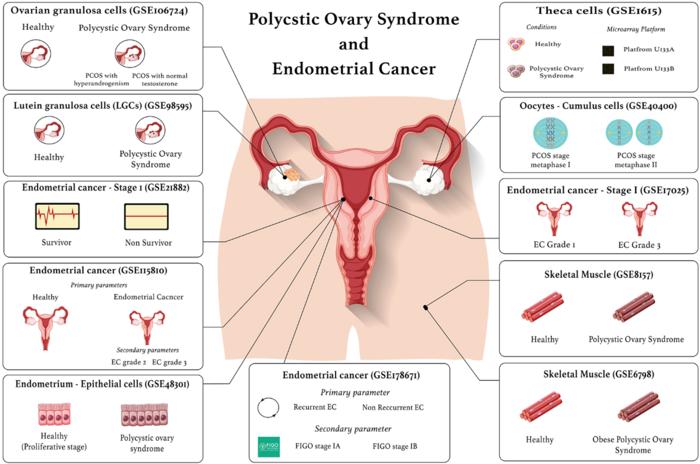“These findings hold significant promise for improving our understanding of mechanistic pathways leading to EC in PCOS.”

Credit: 2023 Alqutami et al.
“These findings hold significant promise for improving our understanding of mechanistic pathways leading to EC in PCOS.”
BUFFALO, NY- September 25, 2023 – A new research paper was published in Oncotarget’s Volume 14 on September 22, 2023, entitled, “Transcriptomic analysis identifies four novel receptors potentially linking endometrial cancer with polycystic ovary syndrome and generates a transcriptomic atlas.”
Polycystic Ovary Syndrome (PCOS) is associated with a 3 to 4-fold increased risk of endometrial cancer (EC), but molecular mechanisms are unclear. Upregulation of the IGF1 gene in PCOS endometrium may increase EC risk, but this is uncertain. In this new study, researchers Fatma Alqutami, Mahmood Hachim, Charlie Hodgman, and William Atiomo from the Mohammed Bin Rashid University of Medicine and Health Sciences and the University of Nottingham aimed to investigate links between EC and PCOS, by analyzing publicly available transcriptomic data.
“The original aim of this study was to investigate the links between EC and PCOS, by analysing publicly available transcriptomic data and investigate IGF-1 and IGFBP gene expression in the endometrium of women with PCOS and EC compared with normal endometrium.”
The NCBI Gene Expression Omnibus was used to identify relevant studies. Differentially expressed genes (DEGs) were identified and analyzed using Metascape to identify pathways of interest. PCOS DEGs that encode proteins secreted into blood were identified using the Human Protein Atlas blood protein database.
EC DEGs that are cellular receptors were identified using EcoTyper. These were intersected to identify which EC receptors interact with PCOS-secreted proteins. Seven receptors were identified in EC but only PTPRF, ITGA2, ITGA3, and ITGB4 genes were expressed on epithelial cells. Pathway enrichment of these genes showed that the major and common pathway involved was that of the PI3K-AKT signaling pathway which was consistent with a link between PCOS and EC. However, IGF1 was down regulated in PCOS and EC.
“Our conclusions at this stage do not support a link between IGF-1 and IGFBP genes in PCOS and EC. However, we have identified four novel receptors which may underpin the risk of EC in PCOS, and we believe our findings provide sufficient evidence to form the basis for a transcriptomic atlas to underpin future research into the links between PCOS and EC and the molecular mechanisms underpinning both diseases.”
Read the full study: DOI: https://doi.org/10.18632/oncotarget.28513
Correspondence to: William Atiomo
Email: [email protected]
Keywords: polycystic ovary syndrome, endometrial cancer, transcriptomics, IGF1, in-silico
About Oncotarget: Oncotarget (a primarily oncology-focused, peer-reviewed, open access journal) aims to maximize research impact through insightful peer-review; eliminate borders between specialties by linking different fields of oncology, cancer research and biomedical sciences; and foster application of basic and clinical science.
To learn more about Oncotarget, visit Oncotarget.com and connect with us on social media:
- X, formerly known as Twitter
- YouTube
- LabTube
- Soundcloud
Sign up for free Altmetric alerts about this article: https://oncotarget.altmetric.com/details/email_updates?id=10.18632%2Foncotarget.28513
Click here to subscribe to Oncotarget publication updates.
For media inquiries, please contact: [email protected].
Oncotarget Journal Office
6666 East Quaker Str., Suite 1A
Orchard Park, NY 14127
Phone: 1-800-922-0957 (option 2)
###
Journal
Oncotarget
DOI
10.18632/oncotarget.28513
Method of Research
Experimental study
Subject of Research
People
Article Title
Transcriptomic analysis identifies four novel receptors potentially linking endometrial cancer with polycystic ovary syndrome and generates a transcriptomic atlas
Article Publication Date
22-Sep-2023




